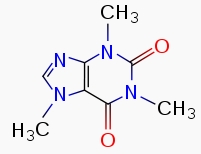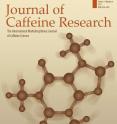Caffeine intake during breastfeeding may harm babies

The chemical structure of caffeine, pictured by Wikipedia sources.
Babies do not metabolize or excrete caffeine very well, so caffeine intake by mothers during breastfeeding may lead to caffeine accumulation and symptoms such as wakefulness and irritability, according to a study published in the peer-reviewed journal Journal of Caffeine Research.
Caffeine is found in a wide variety of products, including coffee, tea, chocolate, soft drinks, sports drinks and some over-the-counter drugs.
Is there a safe caffeine intake during breastfeeding? Is there a potential long-term effect of caffeine exposure on infant development and intelligence? If the mother takes caffeine during pregnancy and forbids caffeine while breastfeeding, will the baby experience withdrawl?
Ruth Lawrence, Ph.D., of the School of Medicine and Dentistry at the University of Rochester, answered these questions based on scientific and medical evidence found in breast-fed babies when they were exposed to caffeine. "in general, a mother, especially one who is breastfeeding, is best advised to limit caffeine intake," he said. After the baby is born, the mother "should eat all the food moderately and avoid partial eating as much as possible to prevent the total intake of caffeine." (biological Valley: compiled by towersimper)

Doi:10.1089/jcr.2011.1212
PMC:
PMID:
Can Consuming Caffeine While Breastfeeding Harm Your Baby? An Interview with Ruth Lawrence, PhD
Ruth Lawrence
It is a well-known fact that the majority of breastfeeding women are caffeine consumers. Perhaps a good place to start would be to discuss what implications this might have.
You are correct. If caffeine is consumed by the mother, then a small amount of caffeine will get into the breast milk and, therefore, into the baby. This is probably not too important later on, but initially in the first week or so, babies do not metabolize and excrete caffeine very well. So, if a mother consumes a lot of caffeine, it accumulates and her baby can become quite symptomatic.
Important Notice :
前街咖啡 FrontStreet Coffee has moved to new addredd:
FrontStreet Coffee Address: 315,Donghua East Road,GuangZhou
Tel:020 38364473
- Prev

Moderate consumption of coffee can reduce the incidence of diabetes.
Chinanews.com, Wuhan, Feb. 26 (Zhou Jin) the author learned from Huazhong University of Science and Technology on the 26th that a new research team led by Professor Huang Kun of the School of Pharmacy of Tongji Medical College of the university believes that drinking about 4 cups of coffee a day for a long time can inhibit harmful protein changes in the body and reduce the risk of diabetes by 50%. The results of this study serve as the weekly essence of the American Chemical Society.
- Next

Coffee basic knowledge hamburger with coffee doubly harmful to health
We all know that Western fast food is not very healthy, but a new study published in the Journal of Nutrition at the University of Guelph in Canada has found that drinking coffee while eating Western fast food can be doubly harmful to your health. Western fast food, such as hamburgers, French fries, pizza and so on, contains a lot of fat. The study found that when healthy people eat a high-fat diet, their blood sugar levels soar, while those consumed with caffeinated drinks
Related
- Beginners will see the "Coffee pull flower" guide!
- What is the difference between ice blog purified milk and ordinary milk coffee?
- Why is the Philippines the largest producer of crops in Liberia?
- For coffee extraction, should the fine powder be retained?
- How does extracted espresso fill pressed powder? How much strength does it take to press the powder?
- How to make jasmine cold extract coffee? Is the jasmine + latte good?
- Will this little toy really make the coffee taste better? How does Lily Drip affect coffee extraction?
- Will the action of slapping the filter cup also affect coffee extraction?
- What's the difference between powder-to-water ratio and powder-to-liquid ratio?
- What is the Ethiopian local species? What does it have to do with Heirloom native species?

